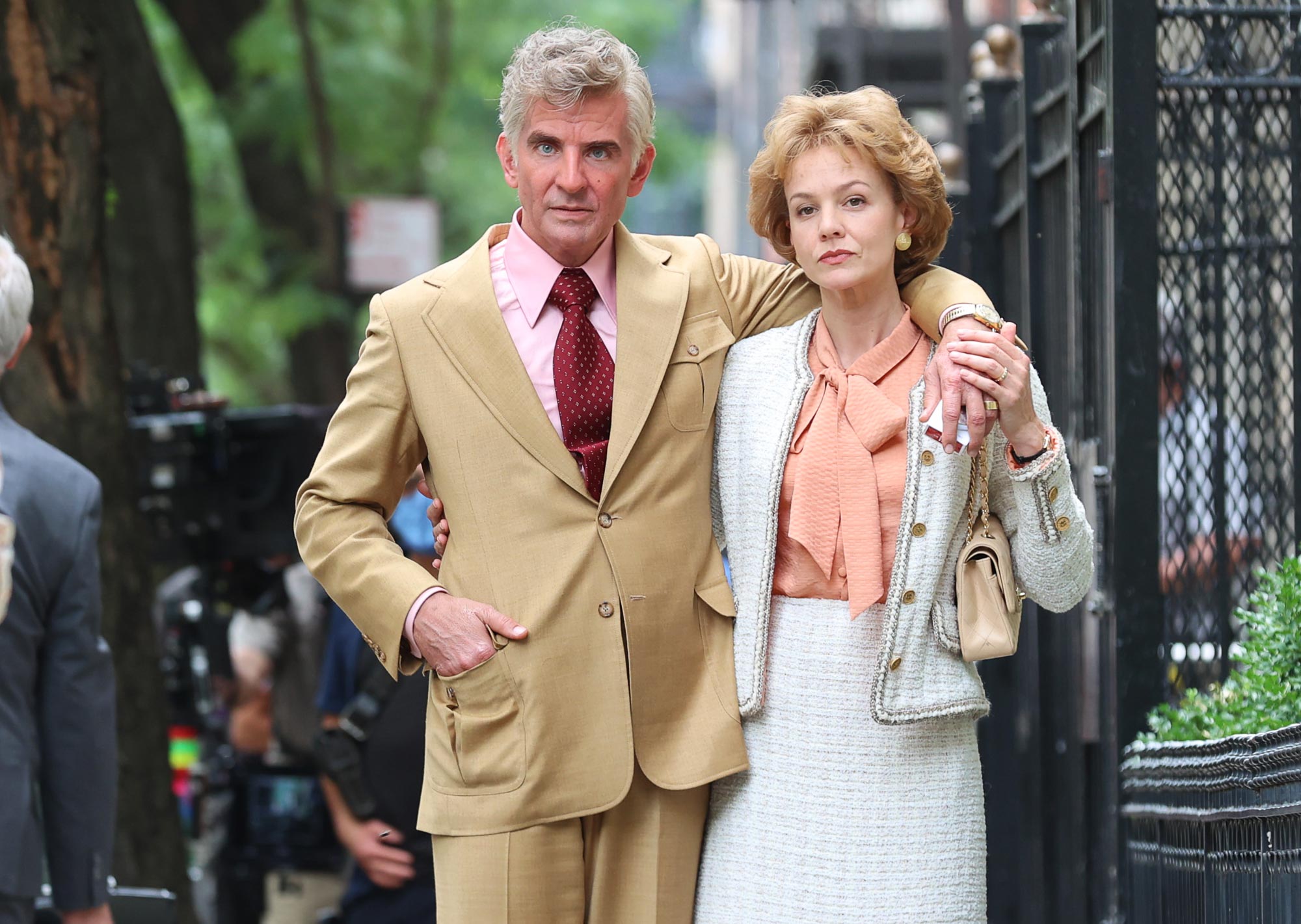
Maestro, starring Bradley Cooper and Carey Mulligan, earns 3.5 stars (out of 4) from Us Weekly movie critic Mara Reinstein.
When the first Maestro trailer dropped in August, too many headlines honed in on Bradley Cooper’s prominent prosthetic nose. The more substantive and surprising takeaway: Carey Mulligan’s top billing in the credits. Um, isn’t this a biopic about music man extraordinaire Leonard Bernstein?! How is Cooper listed second?! In a film called Maestro!
Now that Maestro has premiered — first in Venice last month and then at the New York Film Festival on October 2 — the reasoning is obvious.
Cooper, who also directed and co-wrote the screenplay, has eschewed all the constraints of the traditional womb-to-tomb tale in favor of a beautiful decades-spanning love story. It’s a risky gambit that shouldn’t work in theory considering that Bernstein remains a force of American culture.
Take it a step further. And after the success of the remake of 2018’s A Star Is Born, Cooper could have understandably coasted with a more straightforward project. But he rose to the challenge in presenting all the crescendos of the romance between Bernstein and Mulligan’s Felicia Montealagre. Their romance is a symphony in itself.

Bernstein, for those who don’t know, is the Jewish Massachusetts-born conductor, composer, pianist and educator perhaps best known for creating the wondrous score for West Side Story. He’s frantically introduced as a 25-year-old prodigy called on to fill-in as a conductor for the prestigious New York Philharmonic at Carnegie Hall in the 1940s. (Pity the child actor who didn’t get the chance to play young Lenny.)
Cooper then quickly traces his trajectory via crisp black-and-white cinematography. Bernstein and Montealagre, an elegant Chilean émigré and actress, meet at a smoky house party in New York City and are instantly enamored of each other’s quick wit and creative talent. They fall into bed and share intimate secrets. He woos her while tinkering with the score for the musical On the Town. They soon wed, and their future together looks infinitely bright.
This first part of the relationship is a whirlwind of chatter, name-dropping (“Stevie Sondheim”) and dreamy mania. Occasionally, the frenetic presentation comes off a wee bit pretentious and inaccessible for audiences not well-versed in the mid-20th century theater scene. It is not until Cooper flash-forwards and switches his film into technicolor that Maestro evolves into a breathless melodrama with a fantastically gritty sheen.
That means no behind-the-scenes West Side Story set pieces, no montage of accolades and triumphs. Maestro instead pierces through the couple’s complex dynamic. Montealagre becomes a lonely housewife and mother stirring inside her Connecticut mansion and stops turning a blind eye to her husband’s indiscretions with other men. (Matt Bomer plays one of his discarded boy toys.)
Though diminutive in size, Montealagre is capable of cutting Bernstein down with an insult so brutal that the audience inside NYFF press screening gasped. By contrast, her husband exudes a joie de vivre in every word and movement. In the 1970s, he snorts cocaine with gusto. In the 1980s, despite wrinkles and a mop of messy white hair, he grinds in a nightclub like a man half his age.

Given Cooper and Mulligan’s sterling careers — they have six acting Oscar nominations between them — it seems silly to say that they’re a revelation. But, well, they’re a revelation! Mulligan is in full control of a strong-willed character who refuses to be a second fiddle. Cooper’s portrayal never seems like a ham-fisted imitation. He holds nothing back and becomes more fearless as the film goes along. And, for the record, the nose is the opposite of a distraction.
And yet, Maestro’s real star is the music. As if there were any doubt Bernstein’s stirring compositions stand the test of time, they serve as the film’s score and fill every emotional beat. A six-minute recreation of his legendary conducting of Mahler’s second symphony in 1968 blows the roof off NYC’s Lincoln Center — and, soon, every movie theater with a decent sound system. Just wow.
While Cooper never does reveal the inner-workings of Bernstein’s unconventional and brilliant mind, we know who stayed in his heart.
Maestro, the New York Film Festival Spotlight selection, opens in theaters November 22 and will be on Netflix December 20.








